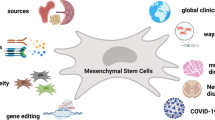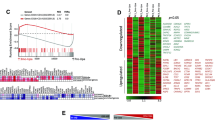Abstract
Objective
The objective of this study was to investigate the efficacy of mesenchymal stem cell (MSC) in the treatment of arthritis.
Methods
Mesenchymal stem cells were injected intravenously into mice with collagen-induced arthritis (CIA). Arthritic indexes were evaluated, and the levels of the pro- and anti-inflammatory cytokines interleukin-10 (IL-10), gamma interferon (IFN-γ)-inducible protein 10 (IP-10), chemokine (C-X-C motif) receptor 3 (CXCR3), interleukin-17A (IL-17A), and tumor necrosis factor α (TNF-α) in serum or splenic cells were determined using real-time RT-PCR, Western blotting, and enzyme-linked immunosorbent assay (ELISA). The proliferation of dendritic cell line D2SC cells was determined using 3H-TdR incorporation assay.
Results
Upon injection of MSCs, overall arthritis symptoms were significantly improved in the CIA mouse models as indicated by the paw edema. Consistent with this observation, serum levels of pro-inflammatory cytokine TNF-α and inflammatory cell infiltration decreased significantly 12 days after MSC injection, while the expression of anti-inflammatory cytokines IL-10, IP-10, and CXCR3 was increased in splenocytes. In addition, we provided evidence that MSCs may directly promote the proliferation of D2SC cells and the expression of IP-10 in D2SC cells in vitro.
Conclusion
Mesenchymal stem cells significantly enhance the efficacy of collagen-induced arthritis treatment, likely through the modulation of the expression of various cytokines.





Similar content being viewed by others
References
Tse WT, Pendleton JD, Beyer WM, Egalka MC, Guinan EC. Suppression of allogeneic T-cell proliferation by human marrow stromal cells: implications in transplantation. Transplantation. 2003;75:389–97.
Pittenger MF, Mackay AM, Beck SC, Jaiswal RK, Douglas R, Mosca JD, et al. Multi-lineage potential of adult human mesenchymal stem cells. Science. 1999;284:143–7.
Deans RJ, Moseley AB. Mesenchymal stem cells: biology and potential clinical uses. Exp Hematol. 2000;28:875–84.
Imanishi Y, Saito A, Komoda H, Kitagawa-Sakakida S, Miyagawa S, Kondoh H, et al. Allogenic mesenchymal stem cell transplantation has a therapeutic effect in acute myocardial infarction in rats. J Mol Cell Cardiol. 2008;44:662–71.
van Poll D, Parekkadan B, Cho CH, Berthiaume F, Nahmias Y, Tilles AW, et al. Mesenchymal stem cell-derived molecules directly modulate hepatocellular death and regeneration in vitro and in vivo. Hepatology. 2008;47:1634–43.
Qian H, Yang H, Xu W, Yan Y, Chen Q, Zhu W, et al. Bone marrow mesenchymal stem cells ameliorate rat acute renal failure by differentiation into renal tubular epithelial-like cells. Int J Mol Med. 2008;22:325–32.
Polchert D, Sobinsky J, Douglas G, Kidd M, Moadsiri A, Reina E, et al. IFN-gamma activation of mesenchymal stem cells for treatment and prevention of graft versus host disease. Eur J Immunol. 2008;38:1745–55.
Iking-Konert C, Ostendorf B, Schneider M. Management of early rheumatoid arthritis. Med Monatsschr Pharm. 2007;30:94–100.
Shang YC, Wang SH, Xiong F, Zhao CP, Peng FN, Feng SW, et al. Wnt3a signaling promotes proliferation, myogenic differentiation, and migration of rat bone marrow mesenchymal stem cells. Acta Pharmacol Sin. 2007;28:1761–74.
Wooley PH, Luthra HS, Stuart JM, David CS. Type II collagen-induced arthritis in mice. I. Major histocompatibility complex (I region) linkage and antibody response. J Exp Med. 1981;154:688–700.
Zhou H, Xu W, Qian H, Yin Q, Zhu W, Yan Y. Circulating RNA as a novel tumor marker: an in vitro study of the origins and characteristics of extracellular RNA. Cancer Lett. 2008;259:50–60.
Wooley PH, Luthra HS, Krco CJ, Stuart JM, David CS. Type II collagen-induced arthritis in mice. II. Passive transfer and suppression by intravenous injection of anti-type II collagen antibody or free native type II collagen. Arthritis Rheum. 1984;27:1010–7.
Mageed RA, Adams G, Woodrow D, Podhajcer OL, Chernajovsky Y. Prevention of collagen-induced arthritis by gene delivery of soluble p75 tumour necrosis factor receptor. Gene Ther. 1998;5:1584–92.
Zhou K, Zhang H, Jin O, Feng X, Yao G, Hou Y, et al. Transplantation of human bone marrow mesenchymal stem cell ameliorates the autoimmune pathogenesis in MRL/lpr mice. Cell Mol Immunol. 2008;5:417–24.
Park SH, Min DJ, Cho ML, Kim WU, Youn J, Park W, et al. Shift toward T helper 1 cytokines by type II collagen-reactive T cells in patients with rheumatoid arthritis. Arthritis Rheum. 2001;44:561–9.
Fox DA. The role of T cells in the immunopathogenesis of rheumatoid arthritis: new perspectives. Arthritis Rheum. 1997;40:598–609.
Maldonado A, Mueller YM, Thomas P, Bojczuk P, O’Connors C, Katsikis PD. Decreased effector memory CD45RA+CD62L− CD8+ T cells and increased central memory CD45RA−CD62L+ CD8+ T cells in peripheral blood of rheumatoid arthritis patients. Arthritis Res Ther. 2003;5:R91–6.
Sekine T, Kato T, Masuko-Hongo K, Nakamura H, Yoshino S, Nishioka K, et al. Type II collagen is a target antigen of clonally expanded T cells in the synovium of patients with rheumatoid arthritis. Ann Rheum Dis. 1999;58:446–50.
Kim WU, Kim KJ. T cell proliferative response to type II collagen in the inflammatory process and joint damage in patients with rheumatoid arthritis. J Rheumatol. 2005;32:225–30.
Ganesan K, Tiwari M, Balachandran C, Manohar BM, Puvanakrishnan R. Estrogen and testosterone attenuate extracellular matrix loss in collagen-induced arthritis in rats. Calcif Tissue Int. 2008;83:354–64.
Kolls JK, Linden A. Interleukin-17 family members and inflammation. Immunity. 2004;21:467–76.
Min SY, Park KS, Cho ML, Kang JW, Cho YG, Hwang SY, et al. Antigen-induced, tolerogenic CD11c+, CD11b+ dendritic cells are abundant in Peyer’s patches during the induction of oral tolerance to type II collagen and suppress experimental collagen-induced arthritis. Arthritis Rheum. 2006;54:887–98.
Miossec P. Interleukin-17 in fashion, at last: ten years after its description, its cellular source has been identified. Arthritis Rheum. 2007;56:2111–5.
Farber JM. Mig and IP-10: CXC chemokines that target lymphocytes. J Leukoc Biol. 1997;61:246–57.
Loetscher M, Gerber B, Loetscher P, Jones SA, Piali L, Clark-Lewis I, et al. Chemokine receptor specific for IP10 and mig: structure, function, and expression in activated T-lymphocytes. J Exp Med. 1996;184:963–9.
Luster AD. Chemokines: chemotactic cytokines that mediate inflammation. N Engl J Med. 1998;338:436–45.
Murphy PM, Baggiolini M, Charo IF, Hébert CA, Horuk R, Matsushima K, et al. International Union of Pharmacology. XXII. Nomenclature for chemokine receptors. Pharmacol Rev. 2000;52:145–76.
Robertson MJ. Role of chemokines in the biology of natural killer cells. J Leukoc Biol. 2002;71:173–83.
Patel DD, Zachariah JP, Whichard LP. CXCR3 and CCR5 ligands in rheumatoid arthritis synovium. Clin Immunol. 2001;98:39–45.
Hanaoka R, Kasama T, Muramatsu M, Yajima N, Shiozawa F, Miwa Y, et al. A novel mechanism for the regulation of IFN-gamma inducible protein-10 expression in rheumatoid arthritis. Arthritis Res Ther. 2003;5:R74–81.
Kageyama Y, Torikai E, Nagano A. Anti-tumor necrosis factor-alpha antibody treatment reduces serum CXCL16 levels in patients with rheumatoid arthritis. Rheumatol Int. 2007;27:467–72.
Acknowledgments
This work was supported by the National Natural Science Foundation of China (no. 30840053, 30471938), Jiangsu Province’s Outstanding Medical Academic Leader Program (no. LJ200614), the Natural Science Foundation of the Jiangsu Province (no. BK2007705, BK2007092, and BK2008232), the Social Development Foundation of Zhenjiang (no. SH2008070), Sci-tech Innovation Team and Talents of Jiangsu University (no. 2008-018-02), and Jiangsu Public Technology Service Platform of Stem Cells and Biotherapy (no. BM2008146).
Author information
Authors and Affiliations
Corresponding author
Additional information
Responsible Editor: J. Di Battista.
Rights and permissions
About this article
Cite this article
Mao, F., Xu, WR., Qian, H. et al. Immunosuppressive effects of mesenchymal stem cells in collagen-induced mouse arthritis. Inflamm. Res. 59, 219–225 (2010). https://doi.org/10.1007/s00011-009-0090-y
Received:
Revised:
Accepted:
Published:
Issue Date:
DOI: https://doi.org/10.1007/s00011-009-0090-y




